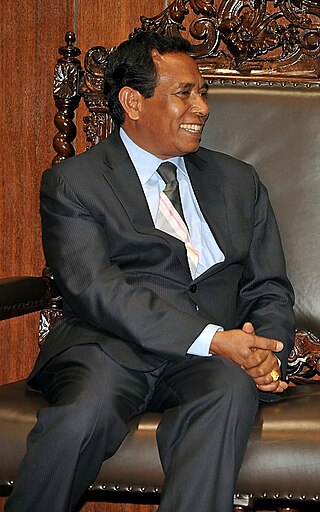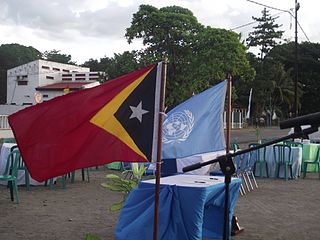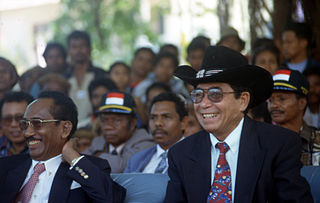Related Research Articles

The Timorese Democratic Union is a conservative political party in East Timor. It was the first party to be established in the country on May 11, 1974, following the Carnation Revolution in Portugal.

The People's Party of Timor is a conservative political party in East Timor. Its predecessor was the Movimento do Povo de Timor-Leste MPTL. The PPT is described as a conservative, backward-looking traditional party with utopian ideas and monarchist and religious tendencies.

Besi Merah Putih, meaning 'red and white iron' in Indonesian, was the official name of an East Timor, approximately 200-strong, pro-Indonesia militia (Wanra). It operated in Maubara, in the district of Liquiçá, and in the neighbourhood of the river Lóis, west of the capital Dili, under the leadership of Manuel de Sousa and with the support of Leoneto Martins, the district administrator (Bupati) of Liquiçá. It was founded on 27 December 1998 in Cai-Cassa, East Timor. The Indonesian ex-general Prabowo had direct links to Besi Merah Putih and trained members at a Kopassus base near Bogor in West Java. Tomé Diogo is also rumoured to have direct links to the BMP. The Indonesian army member is said to have led the militia directly.

Same is a town in the Same administrative post in the interior of East Timor, 81 kilometres (50 mi) south of Dili, the national capital. Same has a population of 7,413 and is the capital of Manufahi municipality, which was known as Same District in Portuguese Timor.

Answered by Fire is a two-part television film based on the 1999 conflicts in East Timor that led to its independence in 2002. The film is based on "Dancing with the Devil: A Personal Account of Policing the East Timor Vote for Independence", which was written by David Savage, an Australian Federal Police Officer who was based in Maliana during the vote and where the fictional "Nunura" is based, who returned to East Timor to lead investigations into the crimes against humanity committed there. The book is published by Monash University Asia Institute, Melbourne David Savage was a technical and script consultant during the filming and also played a minor role.

The Indonesian invasion of East Timor, known in Indonesia as Operation Lotus, began on 7 December 1975 when the Indonesian military (ABRI/TNI) invaded East Timor under the pretext of anti-colonialism and anti-communism to overthrow the Fretilin regime that had emerged in 1974. The overthrow of the popular and short-lived Fretilin-led government sparked a violent quarter-century occupation in which approximately 100,000–180,000 soldiers and civilians are estimated to have been killed or starved to death. The Commission for Reception, Truth and Reconciliation in East Timor documented a minimum estimate of 102,000 conflict-related deaths in East Timor throughout the entire period from 1974 to 1999, including 18,600 violent killings and 84,200 deaths from disease and starvation; Indonesian forces and their auxiliaries combined were responsible for 70% of the killings.

Fernando de Araújo, also known as Lasama was an East Timorese activist and politician. He was a clandestine activist for the independence of East Timor, and then founded the Democratic Party after independence. He was President of the National Parliament of East Timor from 2007 to 2012. He also served as the Acting President for two months in early 2008.

Aniceto Guterres Lopes is an East Timorese politician and human rights lawyer.

The Indonesian occupation of East Timor began in December 1975 and lasted until October 1999. After centuries of Portuguese colonial rule in East Timor, the 1974 Carnation Revolution in Portugal led to the decolonisation of its former colonies, creating instability in East Timor and leaving its future uncertain. After a small-scale civil war, the pro-independence Fretilin declared victory in the capital city of Dili and declared an independent East Timor on 28 November 1975.

The 1999 East Timorese crisis began with attacks by pro-Indonesia militia groups on civilians, and expanded to general violence throughout the country, centred in the capital Dili. The violence intensified after a majority of eligible East Timorese voters chose independence from Indonesia. Some 1,400 civilians are believed to have died. A UN-authorized force (INTERFET) consisting mainly of Australian Defence Force personnel was deployed to East Timor to establish and maintain peace.

East Timor and Indonesia established diplomatic relations in 2002. Both share the island of Timor. Indonesia invaded the former Portuguese colony in 1975 and annexed East Timor in 1976, maintaining East Timor as its 27th province until a United Nations-sponsored referendum in 1999, in which the people of East Timor chose independence. Following a United Nations interim administration, East Timor gained independence in 2002. Indonesia already had a consulate in Dili during the Portuguese colonial period, though Indonesia formalized their relations by establishing an embassy in Dili. Since October 2002, East Timor has an embassy in Jakarta and consulates in Denpasar and Kupang. Relations between the two countries are generally considered highly positive, despite various problems. Numerous agreements regulate cooperation in different areas. East Timorese are visa-free in Indonesia.
The Scorched Earth Operation refers to actions of paramilitary groups during the events of September 1999 in Dili, the capital of East Timor. The country had been under Indonesian occupation since 1975, and resistance by Timorese peaked in 1999. Following a referendum on Timorese independence, pro-Indonesian militia and military rampaged through East Timor destroying vital infrastructure.

The East Timor genocide refers to the "pacification campaigns" of state terrorism which were waged by the Indonesian New Order government during the Indonesian invasion and occupation of East Timor. The majority of sources consider the Indonesian killings in East Timor to constitute genocide, while other scholars disagree on certain aspects of the definition.

The National Resistance of East Timorese Students was a resistance movement of students from East Timor against the Indonesian occupation between 1975 and 1999. RENETIL was established on June 20, 1988, in Denpasar, Bali, Indonesia, by ten East Timorese students. with the leadership of Fernando de Araújo as General Secretary. This organization was later extended to other cities in Indonesia with East Timorese students.

The Mahidi was a militia in East Timor loyal to Indonesia. Its origin is traced back to groups who lost lands and power for fighting the Portuguese and those who collaborated with the Japanese during World War II. The militia was founded in December 1998 and its operations were centered around the Cassa area in the southern Ainaro district. The location is strategic since it is at the crossroads between Manufahi, Ainaro, and Cova Lima districts. Mahidi participated in the 1999 East Timorese crisis, and the group was one of the most violent of the armed forces during the crisis. They were linked to the Suai Church massacre which led to around 200 deaths as well as other mass killings.

Mariano Sabino Lopes, also known by his nom de guerreAssanami, is an East Timorese politician and a member of the Democratic Party (PD).
Anarchism in East Timor has its roots in the country's history as a penal colony, when many anarchists were deported there. The movement eventually evolved into an anti-colonial struggle against succeeding occupying powers: first the Portuguese Empire, then the Japanese Empire and the Indonesian New Order, before the country finally achieved independence in 2002.

East Timor independence formally occurred on 20 May 2002.

João da Costa Tavares was the Commander-in-Chief of the pro-Indonesian Militia in East Timor. He was also a pro-integration militiamen.
References
- ↑ "Amended Indcitment". ICC Legal Tools Database. Retrieved June 15, 2021.
- 1 2 3 4 5 6 7 "Cancio Lopes de Carvalho - Master of Terror". syaldi.web.id. Retrieved 2021-11-15.
- 1 2 3 "Militias in W. Timor remain a threat to E. Timor". etan.org. Retrieved 2021-11-17.
- ↑ "projakarta militia group returns home to east timor". ucanews.com. Retrieved 2021-11-17.
- 1 2 "East Timor Refugees | AP Archive". www.aparchive.com. Retrieved 2021-11-15.
- ↑ Mydans (NYT), Seth (2001-10-19). "World Briefing | Asia: East Timor: Independence Foe Returns". The New York Times. ISSN 0362-4331 . Retrieved 2021-11-17.
- 1 2 3 "Militia leader 'ready for justice'". 2001-10-17. Retrieved 2021-11-15.